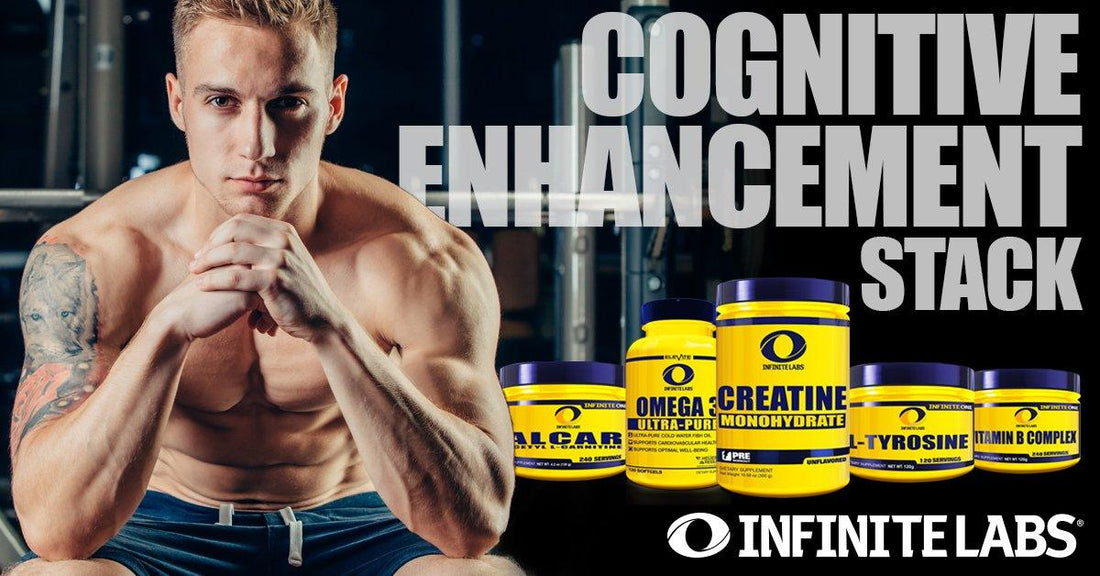

Infinite Labs Cognitive Enhancement Stack
Table of Contents
Infinite Labs Cognitive Enhancement Stack
The technology age is booming and there is no shortage of articles on the internet to satisfy your need for information. When your brain is exposed to an information-rich, stimulating environment, it lights up like a Christmas tree. Every person wants to be able to have a faster recall, sharper cognitive function, and improved creativity. With aging, there is a slow decline in mental function. Cognitive enhancers supply the brain with higher levels of neurotransmitters and stimulate important receptors to improve memory, learning, reasoning, attention and mood. For example, dopamine has been strongly linked with working memory and attention, whereas serotonergic drugs have been prominently associated with mood. There is research to suggest that just like your muscle’s getting weaker with age, so does your brain, if not properly maintained. A modest rate of brain atrophy is observed in normal aging. Here are a few supplements which support cognitive function in adults:
– B-Complex Vitamins
– Omega 3 Fatty Acids
– Creatine
-L-Tyrosine
-ALCAR
B-Complex and Omega 3 Good for the Brain

In the 2016 Journal of Clinical Nutrition, researchers examined the effects of B-Complex vitamins and Omega 3 fatty acids of brain matter. Case-control studies have revealed associations between lower levels of DHA or EPA and brain volume and lower degrees of white matter in the brain. One of the many risk factors for brain function decline is raised plasma total homocysteine levels. Elevated homocysteine levels are a recognized modifiable risk factor for cognitive impairment, dementia, and Alzheimer disease
The atrophy rate of the brain is faster at low plasma vitamin B-12 concentrations and at high plasma homocysteine concentrations. One study found that homocysteine-lowering B vitamins in older people with mild cognitive impairment showed that treatment with high doses of B vitamins markedly reduced the global brain atrophy rate, as well as atrophy rates in those gray matter regions most commonly associated with Alzheimer disease.

Researchers gave subjects with mild cognitive impairment supplements with B-vitamins and omega 3 fatty acids. At the end of the study, the beneficial effect of B vitamin treatment on brain atrophy was observed only in subjects with high plasma omega 3 fatty acids. It is also suggested that the beneficial effect of omega 3 fatty acids on brain atrophy may be confined to subjects with good B vitamin status. The results highlight the importance of identifying subgroups likely to benefit in clinical trials.
Tyrosine
Tyrosine is a precursor for the catecholamine hormones and neurotransmitters, specifically epinephrine, norepinephrine, and dopamine. Tyrosine has been suggested to be ergogenic especially under stressful conditions. Stress depletes the brain reserves of the catecholamine neurotransmitters norepinephrine and dopamine; and it appears that depletion, especially of norepinephrine, is closely related to the stress-induced performance decline. In humans, tyrosine supplementation may alleviate the stress-induced decline in nervous system noradrenaline and, subsequently, enhancing performance under a variety of circumstances including sleep deprivation, combat training, cold exposure, etc.
Creatine
Many people think of creatine as strictly a muscle and performance enhancing supplement, but two studies have shown creatine to improve memory and attention span. One 2009 study showed that creatine is capable of increasing I.Q, attention span and working memory. Creatine is stored in the brain, just like the muscle, which is essential for the synthesis of ATP.
ALCAR (Acetyl-L-Carnitine)
ALCAR benefits center around improved mental and physical performance, increased energy, focus, and strength as well as enhanced whole-body health. Acetyl-L-Carnitine is a modified version of the natural supplement L-Carnitine, but it has a slightly different chemical structure that means it is more bioavailable. ALCAR is also able to cross over from the blood stream into the brain which means it can affect cognitive function in ways that L-Carnitine cannot.

ALCAR has been shown to alleviate signs of aging and disease on mitochondria (the body’s membrane for producing energy) and protect networks, alleviate effects of aging such as neurological decline and chronic fatigue and support insulin sensitivity and blood vessel health. This amino acid is considered to be neuroprotective because it has the ability to cross the blood-brain barrier, Studies have found that elderly patients who consume ALCAR supplements perform better on examinations of directional memory and verbal memory skills. This natural compound can further product nerve cells in the brain from damaged caused by a lack of oxygen.
Rosca MG, Lemieux H, Hoppel CL. Mitochondria in the elderly: Is acetylcarnitine a rejuvenator? Adv Drug Deliv Rev. 2009
Barrett AM. A 1-year controlled trial of acetyl-L-carnitine in early-onset AD. Neurology. 2001
Brooks JO 3rd, Yesavage JA, Carta A, Bravi D. Acetyl L-carnitine slows decline in younger patients with Alzheimer’s disease: a reanalysis of a double-blind, placebo-controlled study using the trilinear approach. Int Psychogeriatr. 1998
Montgomery SA, Thal LJ, Amrein R. Meta-analysis of double-blind randomized controlled clinical trials of acetyl-L-carnitine versus placebo in the treatment of mild cognitive impairment and mild Alzheimer’s disease. Int Clin Psychopharmacol 2003;18:61-71.
Ames BN, Liu J. Delaying the mitochondrial decay of aging with acetylcarnitine. Ann NY Acad Sci 2004;1033:108-16.
Hagen TM, Ingersoll RT, Wehr CM, Lykkesfeldt J, Vinarsky V, Bartholomew JC, Song MH, Ames BN. Acetyl-L-carnitine fed to old rats partially restores mitochondrial function and ambulatory activity. Proc Natl Acad Sci USA 1998;95:9562-6.
Rae C, Digney AL, McEwan SR, Bates TC. Oral creatine monohydrate
supplementation improves brain performance: a double-blind, placebo-controlled, cross-over trial. Proc Biol Sci. 2003 Oct 22;270(1529):2147-50.
Watanabe A, Kato N, Kato T. Effects of creatine on mental fatigue and cerebral hemoglobin oxygenation. Neurosci Res. 2002 Apr;42(4):279-85.
Klein AM, Ferrante RJ. The neuroprotective role of creatine. Subcell Biochem. 2007;46:205-43.
Klopstock T, Elstner M, Bender A. Creatine in mouse models of
neurodegeneration and aging. Amino Acids. 2011 May;40(5):1297-303.
Huang TL Omega-3 fatty acids, cognitive decline, and Alzheimer’s disease: a critical review and evaluation of the literature. J Alzheimers Dis 2010;21:673–90.
Smith AD. The worldwide challenge of the dementias: a role for B-vitamins and homocysteine? Food Nutr Bull 2008;29(2 Suppl):S143–72.
Smith AD, Smith SM, de Jager CA, Whitbread P, Johnston C, Agacinski G, Oulhaj A, Bradley KM, Jacoby R, Refsum H. Homocysteine-lowering by B-vitamins slows the rate of accelerated brain atrophy in mild cognitive impairment: a randomized controlled trial. PLoS ONE 2010;5:e12244.

















